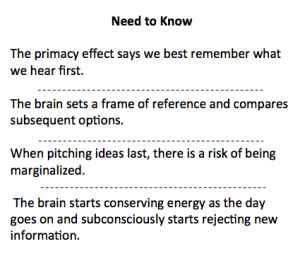It is Past Time to Slaughter Your Sacred Cow
November 28, 2015 ~ Written by: W.B. “Bud” Kirchner
 “Progress is impossible without change, and those who cannot change their minds cannot change anything.” ~ George Bernard Shaw
“Progress is impossible without change, and those who cannot change their minds cannot change anything.” ~ George Bernard Shaw
I expect you have read (or figured out) that the rationale for these articles is the premise that there is a lot of useful information originating from the world of neuroscience and psychology including related cognitive sciences (but I have combined them under the heading of the Business Brain Model) and what business does.
As a practical example let’s choose a standard business process “the pitch.” Pitches are made for numerous reasons – to get an engagement, sell a good or service, land a job, etc.
The vast majority of business builders and managers I know believe it is best to pitch last. I have heard reasons such as you will “stick in their minds” and in fact I’ve found people refer to it as a ‘golden rule.’
In various articles in the context of the Business Brain Model I have touched on reasons why the smart businessperson does the opposite. Well now it is time to focus on this one aspect and see how far this ‘sacred cow’ has led us off base.
Primacy vs. Recency
I know – those words sound made up but each has a designated “effect” in terms of memory recall and psychology.
“The ‘primacy effect’ basically says we best remember what we hear first. The ‘recency effect’ is of course the opposite that we best recall what we hear last.
The ‘primacy effect’ basically says we best remember what we hear first. The ‘recency effect’ is of course the opposite that we best recall what we hear last.
In a previous article here titled “Business vs. Science: Are you losing this fight?” I pointed out that it is “proven the brain sets a frame of reference and compares subsequent options.” That my friend affirms the ‘primacy effect’ and that is why you must pitch first.
Another reason to pitch first – brain fatigue. Case in point:
- The brain represents about 2% of your body weight but burns 20% of your energy.
- As a result your brain will start to conserve energy “as the day goes on.”
- In the process of conserving energy your brain will (subconsciously) be rejecting or not processing new information.
- In an effort to conserve energy the brain looks for help.
- Decisions are made in the context of information/ideas already in the brain.
- Framing/priming/reciprocity are all processes that set a benchmark in the brain of your counterparty and subsequent information is measured against them.
- In other words your position becomes the default decision.
I talk more about brain fatigue and conserving energy in part four of my series on Thinking Errors titled “Arming Yourself in the Battle with Your Mind.” I point out that “when the brain pushes to conserve energy, we do things such as to reduce issues to (too) simple form and group (unrelated) items.”
Think about it this way – if you pitch last, you risk being marginalized.
All these fundamental issues are exacerbated by the ‘volume’ of decisions in today’s world, all of which are fatiguing the brain, that are encouraging the brain to look for shortcuts. This is about as cut and dry as these things get.
If you read my article “The Sound of Your Passion Aroused” then you know my love of music. Even if you haven’t read that article, you know the cliché that an opera “ain’t over till the fat lady sings.” I wouldn’t dare call the late great Beverly Sills fat, but I will let the opera legend’s words end this show:
“There are no shortcuts to any place worth going.” ~ Beverly Sills
About the Author: W.B. “Bud” Kirchner is a serial entrepreneur and philanthropist with more than 50 years of business success. He is not a scientist or an academic but he does have a diversified exposure to neuroscience, psychology and related cognitive sciences. Generally speaking, the ideas he expresses here are business-angled expansions of other people’s ideas, so when possible, he will link to the original reference.
